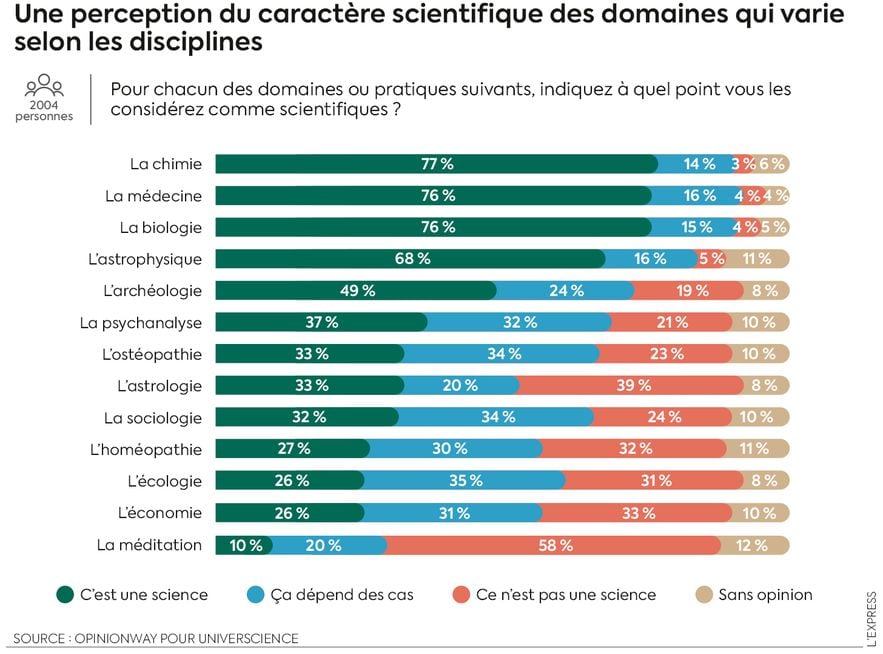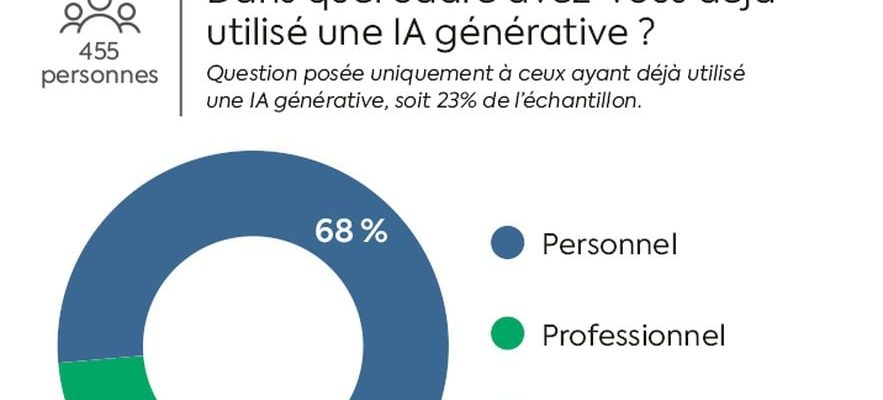Would France be the most fearful nation in the world when it comes to new technologies? If our fellow citizens mostly see artificial intelligence (AI) as a “major technological revolution for humanity” in the same way as printing (61%), more of them want to supervise it and regulate it (85%), as well as believing that it raises new ethical and legal questions (77%). The public establishment Universcience (grouping of the Cité des sciences and the Palais de la Découverte) publishes the third edition of the critical thinking barometer, in partnership with L’Express. Carried out by OpinionWay on a sample of 2004 people, the survey looks at the French people’s relationship with science and the media, as well as the construction of their personal opinion. This year, the barometer focuses on AI. “The results confirm a French specificity” analyzes Michel Dubois, research director at the National Center for Scientific Research, director of the Study Group for Sociological Analysis Methods at the Sorbonne (Gemass) and member of the barometer’s scientific committee. “People see that there is something innovative in AI, but they do not imagine that this technology can develop by itself. For us, we absolutely have to put a framework in place, because we have the “I feel like things are going to get out of hand. It’s innovation that generates anxiety.”
© / The Express
Asked about the opportunities or dangers of the development of AI in different sectors, respondents most often answer that it poses “as many risks as advantages”. If they are more confident about the benefits of AI in the field of health, scientific research or transport, they are however worried about its impact on education, information and employment. or human relations. For Michel Dubois, “this is yet another illustration of the complicated relationship in France to technological innovation. In the minds of our compatriots, the advantages never take precedence over the risks. This investigation echoes that carried out by the Gemass on the French and science. On a global scale, we are the world champions of this expression of ambivalence about science and technology.”
The barometer also illustrates the large gap between these widespread concerns and the actual use of generative AI, such as ChatGPT, which remains restricted. If 65% of those questioned have already heard of it, only 23% have tested it, with 34% not knowing what it is. It will be noted that young people (80%), men (70%) and CSP + (77%) are more likely to have heard of this technology or to use it. “There are a lot of fantasies on ChatGPT, but we see that this still concerns few people. 18-35 year olds are clearly at the forefront on the subject,” notes Michel Dubois. Users of generative AI mainly use it to learn about a subject (68%), and to translate (61%) or write (59%) a text. On the other hand, far fewer use it to create images or music (42%).
37% of French people believe that psychoanalysis is a science
Another new feature of this 2024 edition: the barometer asked respondents to evaluate the scientific nature of different disciplines and fields. Unsurprisingly, those surveyed overwhelmingly consider that chemistry (77%), medicine (76%) or biology (76%) are a science. On the other hand, pseudoscientific disciplines obtain relatively high scores. For example, 37% of French people believe that psychoanalysis is a science, and 32% that it depends on the case, compared to only 21% who consider that it is not a science. Same thing for osteopathy (67% answer that “it is a science” or that “it depends on the case”) and homeopathy (57%).
Conversely, the human sciences struggle to impose an image of scientificity. Only a minority of respondents believe that sociology (32%) or economics (26%) represent a science. Same thing for ecology (26%). We notice that people positioning themselves on the left defend the scientific nature of psychoanalysis more (45% among people “very left”), while on the right, we are much more critical of the scientific nature of sociology or ecology. The more we go towards the political extremes, on the left and on the right, the more homeopathy will be perceived as being scientific.

© / The Express
Effects of the Covid-19 pandemic
The 2024 barometer also confirms the major lessons from previous editions on the relationship of the French to science. 69% of respondents say they are interested in scientific subjects such as those relating to new technologies, more than sport (48%) or politics (61%). 61% of respondents say they have scientific activities at least once a month (+6 points compared to 2023), led by consulting documentaries (42%), websites (37%) and videos on the Web (32%). Similarly, 41% of respondents engage in scientific activities as part of their leisure time, with exhibition visits in mind (27%). “When we ask them more specifically about the scientific and technological fields that interest them, it is health (41%) as well as climate and ecology (31%) which come out on top – ecology being more cited by respondents classify themselves on the left. Strong gender disparities nevertheless appear, with only 16% of women for example declaring that they are regularly informed about digital technology and AI, compared to 36% for men; the same for energy and nuclear power. , which interest 36% of men, but 15% of women surveyed” underlines Romain Pigenel, director of audience development and communication at Universcience.
On average, the French have a positive image of science. 88% believe that it allows us to better understand the world and develop new technologies useful to all. But here again, we find this very French ambivalence towards progress, with 72% also saying that scientific knowledge can be dangerous.
6 out of 10 people think that “scientists follow strict ethical rules”, but only half believe that “the scientific community is independent in validating its results”. For Michel Dubois, we must undoubtedly see the effect of the Covid-19 pandemic and its scientific controversies, starting with the personal drift of Professor Didier Raoult, which have left traces. “There is growing doubt about the ability of scientists to remain independent from industrial or political actors.”
Optimism for young people
Finally, the barometer contradicts pessimistic speeches about young people. Far more people aged 18-24 than older people believe that scientists follow strict ethical rules (70%) or that they are independent (65%). They also trust AI more. “We have a lot of anxiety-provoking talk about 18-24 year olds, but this survey shows quite enthusiastic results, with a more positive vision of scientists than among their elders,” observes Michel Dubois.
On the other hand, young people seem less open to debate regarding social or scientific subjects. 64% of them prefer to communicate with people who share their opinions rather than with different opinions (a result up 7 points), compared to 46% for all French people. As might be expected, the Internet (72%, up 5 points compared to 2023) and social networks (63%, up 9 points) serve as their main sources of information, while that in the general population, television remains in the lead, tied with the Internet (49%). The paper press is declining sharply among young people (22%, -8 points). However, this generation’s confidence in the reliability of the Internet (40%) and social networks (30%) has fallen sharply (-12 points) compared to last year. Here again, we can see good news…
